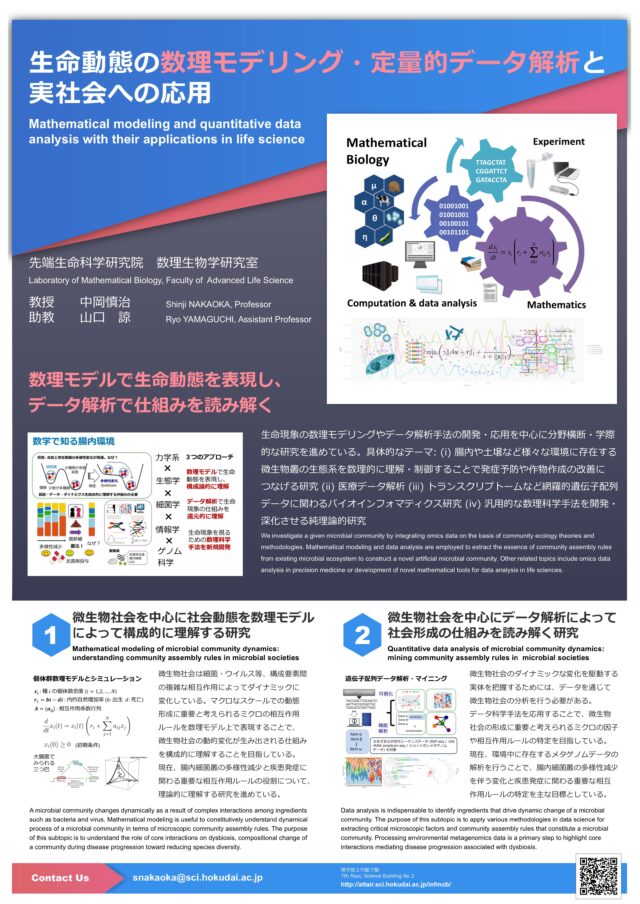Laboratory of Mathematical Biology
- Research Theme
- mathematical modeling and data analysis in life science
- Research Keywords
mathematical biology, systems biology, bioinformatics, microbial ecology, precision medicine, multi-omics, mathematical modeling, machine learning, big data analysis
Staff
Overview of Research and Education
In our laboratory, mathematical and statistical models are employed to work with experimental or field biologists in order to understand biological phenomena of interest, or quantitatively characterize data. Primary research target of our laboratory is to develop ecomics and ecomimetics. The former represents a type of research to investigate a given microbial community by integrating omics data on the basis of community ecology theories and methodologies. While the latter is motivated by biomimetics to represent a type of study to extract the essence of community assembly rules from existing microbial ecosystem to construct a new artificial microbial community. Other related topics in our laboratory include omics data analysis in precision medicine or the development of novel mathematical tools for data analysis in life sciences.
Laboratory of Mathematical Biology (pdf)
Charge
- Charge (US):
School of Science, Biological Science course (Macromolecular Functions), Core Laboratories - Charge (GS):
Graduate School of Life Science, Division of Life Science, Transdisciplinary Life Science Course, Bioinformation and Molecular Sciences
Contact
- Address
-
7th floor, Science Building No 2, Kita 10, Nishi 8, Kita-ku, Sapporo, Hokkaido 060-0810, JAPAN
- Phone
- +81 11-706-2774 (ext. 2774)
- snakaoka*sci.hokudai.ac.jp (Please replace * with @ when sending e-mail.)
Representative Publications
Junya Sunagawa, Hyeongki Park, Kwang Su Kim, Ryo Komorizono, Sooyoun Choi, Lucia Ramirez Torres, Joohyeon Woo, Yong Dam Jeong, William S Hart, Robin N Thompson, Kazuyuki Aihara, Shingo Iwami, Ryo Yamaguchi. Isolation may select for earlier and higher peak viral load but shorter duration in SARS-CoV-2 evolution. Nature Communications, 14(1), 7395, 2023.
Shintaro Nakano, Yasuyuki Kawamoto, Yoshito Komatsu, Rika Saito, Ken Ito, Takahiro Yamamura, Kazuaki Harada, Satoshi Yuki, Kazumichi Kawakubo, Ryo Sugiura, Shin Kato, Koji Hirata, Hajime Hirata, Masahito Nakajima, Ryutaro Furukawa, Yunosuke Takishin, Kousuke Nagai, Isao Yokota, Keisuke H Ota, Shinji Nakaoka, Masaki Kuwatani, Naoya Sakamoto. Analysis of the Pancreatic Cancer Microbiome Using Endoscopic Ultrasound-Guided Fine-Needle Aspiration-Derived Samples, Pancreas 51(4) 351-357 2022/4/1.
Kenta Suzuki, Masato S Abe, Daiki Kumakura, Shinji Nakaoka, Fuki Fujiwara, Hirokuni Miyamoto, Teruno Nakaguma, Mashiro Okada, Kengo Sakurai, Shohei Shimizu, Hiroyoshi Iwata, Hiroshi Masuya, Naoto Nihei, Yasunori Ichihashi, Chemical-Mediated Microbial Interactions Can Reduce the Effectiveness of Time-Series-Based Inference of Ecological Interaction Networks, International journal of environmental research and public health 19(3) 2022/1/22.
Yosuke Komatsu, Daiki Kumakura, Namiko Seto, Hirohisa Izumi, Yasuhiro Takeda, Yuki Ohnishi, Shinji Nakaoka, Tomoyasu Aizawa, Dynamic Associations of Milk Components With the Infant Gut Microbiome and Fecal Metabolites in a Mother-Infant Model by Microbiome, NMR Metabolomic, and Time-Series Clustering Analyses, Frontiers in nutrition 8 813690-813690 2021.
Ryo Yamaguchi and Sarah P. Otto. Insights from Fisher’s geometric model on the likelihood of speciation under different histories of environmental change. Evolution 74, 1603-1619 (2020).
